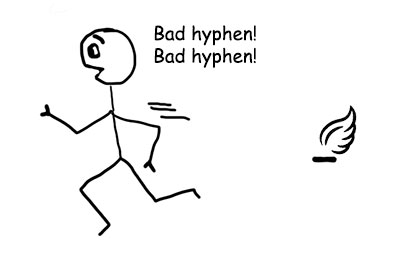
I’ve talked before about how language goes through changes in fashion. What I didn’t mention is that such fashion includes grammar mistakes.
I’ve been doing the editing thing for a while now, and what I first thought was just my heightened awareness of language errors has given way to seeing specific grammar errors suddenly reach a tipping point and become a lot more common.
For example, I’ve talked about the sharply increasing number of instances where people misuse the reflexive pronoun (e.g., myself, itself), and I’m planning a post on how people, thinking they shouldn’t end a sentence with a preposition, leave off the preposition altogether. (Exciting, no?)
Get a free sample proofread and edit for your English document.
Two professional proofreaders will proofread and edit your English document.
Recently, I’ve been noticing an increase in the error of putting a hyphen between a modifier and the word it modifies. I did mention once in a post on hyphens, “When the words in front of nouns are already modifiers (adverbs or adjectives), no hyphen is used,” but I didn’t elaborate. So, that’s what I’d like to do today.
What Is a Modifier?
A modifier is a word that affects the meaning of another word. Note how the meaning of otherwise identical sentences changes when I change the modifier (in bold).
The word being modified is “listened,” a verb. “Enthusiastically,” “listlessly,” and “angrily” are modifiers of “listened,” and specifically, they are adverbs.
The other type of modifier is an adjective, and these modify nouns. Again, changing only the adjective changes the meaning of the sentence.
I need to note that modifiers can also modify other modifiers.
Where Is a Modifier?
Unlike with some other languages, it’s pretty easy to spot the modifier in an English sentence because it will typically be next to the word it is modifying. Adverbs come before or after verbs, and adjectives (with rare exceptions) come before nouns. So, take the following sentence:
We know that “brown” modifies “pelican, “quickly” modifies “scooped,” and “pale” modifies “fish” because the words are next to each other.
It’s pretty simple.
So What’s the Problem?
As I said, modifiers can modify other modifiers, and when it comes to adverbs, the hyphen is sometimes involved and sometimes not.
Consider the following:
“Environmentally” is an adverb modifying the following word, “impactful,” which is an adjective that in its turn modifies the following noun, “proposal.” This is quite clear and straightforward.
And yet, what am I seeing with increasing frequency?
Argh! What is that hyphen doing there? Shoo!

Hyphens are only needed with modifiers when there is a chance for confusion about what is modifying what.
Let’s take a sentence with a straightforward adverb.
This is great. No cause for confusion. However, the sentence can also be phrased as the following:
By using the hyphen correctly, we’re clearly coupling the noun “science” with the adjective “based.” In other words, without the hyphen, the noun (and non-modifier) “science” would just be sitting there doing nothing:
We might well wonder what a “based study” is. With the hyphen, we know [science-based] together modify “study.”
Look over the next examples. The use and nonuse of the hyphen should be clear.
So, as with pretty much all things grammatical, it’s just a matter of making sure to use something only when it’s needed.
Julia H.
Get a free sample proofread and edit for your English document.
Two professional proofreaders will proofread and edit your English document.
Get a free sample proofread and edit for your document.
Two professional proofreaders will proofread and edit your document.
We will get your free sample back in three to six hours!